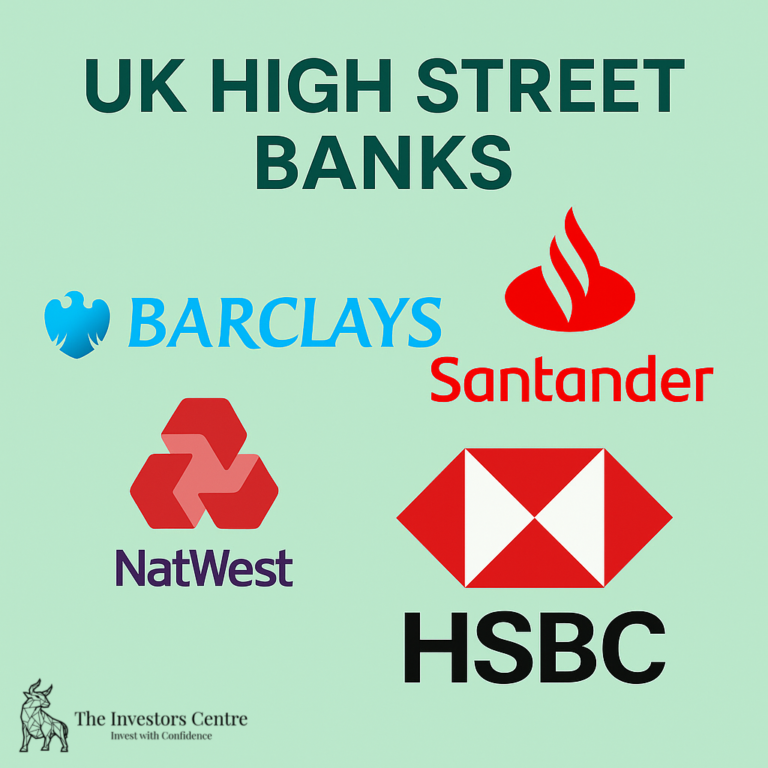
- expertise:
- CFD Trading, Forex, Derivatives, Risk Management
- credentials:
- Chartered ACII (2018) · Trading since 2012
- tested:
- 40+ forex & CFD platforms with live accounts

- expertise:
- Platform Testing, Cryptocurrency, Retail Investing
- credentials:
- Active investor since 2013 · 11+ years experience
- tested:
- 50+ platforms · 200+ guides authored

- expertise:
- Broker Comparison, ISA Strategy, Portfolio Management
- credentials:
- Active investor since 2013 · 11+ years experience
- tested:
- 40+ brokers with funded accounts

- expertise:
- CFD Trading, Forex, Derivatives, Risk Management
- credentials:
- Chartered ACII (2018) · Trading since 2012
- tested:
- 40+ forex & CFD platforms with live accounts

- expertise:
- Platform Testing, Cryptocurrency, Retail Investing
- credentials:
- Active investor since 2013 · 11+ years experience
- tested:
- 50+ platforms · 200+ guides authored

- expertise:
- Broker Comparison, ISA Strategy, Portfolio Management
- credentials:
- Active investor since 2013 · 11+ years experience
- tested:
- 40+ brokers with funded accounts
How We Test
Real accounts. Real money. Real trades. No demo accounts or press releases.
What we measure:
- Spreads vs advertised rates
- Execution speed and slippage
- Hidden fees (overnight, withdrawal, conversion)
- Actual withdrawal times
Scoring:
Fees (25%) · Platform (20%) · Assets (15%) · Mobile (15%) · Tools (10%) · Support (10%) · Regulation (5%)
Regulatory checks:
FCA Register verification · FSCS protection
Testing team:
Adam Woodhead (investing since 2013), Thomas Drury (Chartered ACII, 2018), Dom Farnell (investing since 2013) — 50+ platforms with funded accounts
Quarterly reviews · Corrections: [email protected]
Disclaimer
Not financial advice. Educational content only. We're not FCA authorised. Consult a qualified advisor before investing.
Capital at risk. Investments can fall. Past performance doesn't guarantee future results.
CFD warning. 67-84% of retail accounts lose money trading CFDs. High risk due to leverage.
Contact: [email protected]
Finding a UK bank that won’t block your crypto transactions shouldn’t be this difficult — but in 2026, it still is. Some banks process transfers to exchanges without a second thought, while others treat every crypto payment like a fraud alert.
I’ve tested the major high street and challenger banks myself, and the difference in experience is night and day. This guide breaks down which UK banks are genuinely crypto-friendly, which ones to avoid, and how to set yourself up so you’re never stuck with a frozen payment at the worst possible moment.
Quick Answer: What are the most crypto-friendly UK banks in 2026?
Revolut, Monzo, and Starling are our top picks for smooth crypto transactions. Avoid high street banks like HSBC and Santander due to frequent blocks. For the best experience, consider using a dual-banking setup with one crypto-friendly account alongside your primary bank.
What's Changed for Crypto-Friendly Banks in 2026?
The landscape has shifted since last year. Challenger banks like Revolut, Monzo, and Starling continue to lead the way, with even smoother integrations to FCA-registered exchanges. Meanwhile, traditional banks remain cautious — HSBC and Santander still routinely block crypto payments, and NatWest’s transaction limits haven’t improved much. On the regulatory side, the FCA’s tightening crypto marketing rules have actually helped clarify which platforms banks are willing to work with, making compliant exchanges like eToro and Kraken safer bets than ever. If you’re still banking with a high street name for your crypto activity, 2026 is the year to reconsider.

 UK New Clients
UK New Clients
61% of retail CFD accounts lose money when trading CFD’s with this provider.
What does a “crypto-friendly” UK bank look like?
Why are some UK banks still anti-crypto?
It usually comes down to risk appetite and infrastructure. Some traditional banks still view crypto as high-risk, not because they’re anti-innovation, but because these banks are heavily influenced by regulatory pressure, particularly when it comes to anti-money laundering (AML) rules and FCA compliance.
There are also concerns about fraud — banks become nervous about scams and phishing attacks linked to cryptocurrency, so they overreact and restrict everything. And let’s be honest, some of them are just slow to evolve. Their systems weren’t built for real-time, high-frequency crypto transactions, and it shows.
Tip: Before moving large amounts, always start with a small transaction to test whether a bank blocks or flags it. It’s a quick way to avoid surprises — and a frozen account.
Which Banks Are the Best for Crypto Transactions?
How do challenger banks compare for crypto users?
If you’re looking for a bank that plays nicely with crypto, challenger banks are significantly ahead of the traditional high-street giants. They are more agile, app-driven, and open to working with FCA-regulated exchanges.
Revolut
Revolut has been the most crypto-forward bank I’ve used so far. Not only does it support instant transfers to established exchanges like eToro, but it also has a built-in crypto wallet that lets you buy, sell, and hold Bitcoin and other coins right inside the app. It’s custodial (meaning you don’t control your private keys), but for casual investing or quick trades, it’s hard to beat for convenience.
I’ve never had a Revolut transaction blocked — and their real-time notifications give me peace of mind when I’m moving funds during a market dip. Just make sure your account is fully verified to avoid any friction.
Starling
Monzo
What about traditional banks?
Barclays
Barclays is probably the most “crypto-tolerant” of the big banks. They used to work directly with Coinbase, and although that partnership ended, I’ve still had success transferring crypto to and from using Barclays.
They don’t publish a specific crypto policy, but from my experience, they handle FCA-registered exchanges on a case-by-case basis. So you may be fine one week and hit a limit the next. Not ideal, but better than some.
NatWest
NatWest has been more cautious. When I tried to send funds, I hit a daily spending cap I wasn’t expecting. They do allow transfers to major exchanges, but you’ll run into low transaction limits, and they’ve issued warnings to customers about crypto risks.
In general, I’ve found NatWest to be a “maybe” bank — okay for small, infrequent crypto transactions, but not something I’d rely on if I’m moving money regularly.
HSBC and Santander
TLDR? If you’re active in the cryptocurrency space, I strongly recommend opting for a challenger bank. They’re more flexible, faster, and generally much more transparent when it comes to crypto transactions.
| Bank Name | Crypto Policy | FCA-Exchange Support |
|---|---|---|
| Revolut | Fully supportive | Yes |
| Monzo | Friendly | Yes |
| Starling | Semi-friendly | Yes (some) |
| Barclays | Conditional | Yes (case-by-case) |
| NatWest | Limited | Some |
| HSBC | Hostile | No |
| Santander | Hostile | No |
Can You Buy Crypto Directly Through a UK Bank?
Sort of — but don’t expect most high street names to make it easy.
The only bank I’ve used that offers crypto trading inside the app is Revolut. It’s convenient since you can buy, hold, or sell a handful of major cryptocurrencies like Bitcoin, Ethereum, and a few altcoins right from your mobile banking screen. If you’re looking for a quick way to get exposure without signing up for a separate exchange, it’s a decent option.
But it’s worth being clear: while it’s accessible, it comes with a few trade-offs.
First, the spreads and fees on Revolut’s crypto trades are definitely higher than what you’d get on a dedicated exchange. It’s not outrageous, but over time, especially with larger amounts, it adds up.
Second, the token selection is limited. You won’t find every trending altcoin or niche project — just the big names.
And finally, the biggest trade-off in my opinion: Revolut uses a custodial model, which means you don’t control your crypto wallet keys. That’s fine for short-term trades or dipping your toes in, but if you’re serious about crypto, you’ll want a non-custodial wallet eventually.
Banks like Monzo and Starling don’t offer in-app crypto trading yet, but they do allow you to send funds to exchanges without too much trouble, which honestly, is often a better route if you’re looking for lower fees and more flexibility.
How Do UK Bank Policies on Crypto Compare?
There’s a huge difference between a bank that says “we support crypto” and one that actually follows through without causing delays, blocks, or headaches.
I’ve put together a side-by-side comparison based on my own experience and what I’ve seen in the crypto community — particularly when it comes to policy transparency, customer support, and real-world user feedback.
Some banks make it easy to move funds in and out of exchanges. Others? You’re lucky if your payment even clears without being flagged.
Here’s how they stack up:
| Bank Name | Crypto Stance | Transparency | Customer Support | Trustpilot Crypto Mentions | Overall Rating |
|---|---|---|---|---|---|
| Revolut | Supportive | High | Very responsive | Mostly positive | ⭐⭐⭐⭐⭐ |
| Monzo | Friendly | High | Good | Mixed (mostly positive) | ⭐⭐⭐⭐☆ |
| Starling | Improving | Medium | Good | Cautious but responsive | ⭐⭐⭐⭐ |
| NatWest | Conservative | Low | Inconsistent | Often flagged issues | ⭐⭐⭐ |
| HSBC | Unfriendly | Very low | Unhelpful | Many blocks reported | ⭐⭐ |
What Are the Risks of Using a UK Bank for Crypto?
Even in 2026, dealing with crypto through your UK bank can feel like walking a tightrope. I’ve personally had transactions flagged, delayed, and in one case, had a temporary freeze placed on my account just for sending money to a well-known exchange. And I’m not alone — I’ve heard similar stories from plenty of people in the crypto community.
The biggest risk? Your account being frozen or flagged. Banks are particularly cautious when it comes to large or frequent transfers to crypto exchanges — especially if the platform hasn’t been registered with the FCA or is based overseas. I’ve seen this happen even with relatively small amounts.
It’s frustrating, but from the bank’s point of view, they’re trying to protect against fraud, scams, and money laundering — and unfortunately, legitimate users sometimes get caught in that net.
How can I avoid these issues?
Here’s what’s worked for me:
- Stick to FCA-registered exchanges. These are the ones most UK banks recognise and tolerate.
- Keep your transfers consistent — frequent but modest amounts are less likely to raise flags than large, sudden transactions.
- Break big transfers into smaller chunks. I once had a £2,000 transfer blocked, but when I split it into two £1,000 sends a few hours apart, it went through smoothly.
- Let your bank know if you plan to trade regularly. Some challenger banks appreciate the heads-up and may even note it on your account.
Are Business Bank Accounts Crypto-Friendly Too?
If you’re running a crypto-related business — whether that’s consulting, mining bitcoin in the UK, or even just managing client payments in Bitcoin — things get a little trickier. I’ve gone through this process myself, and I can tell you firsthand: personal accounts are generally more forgiving than business ones.
That’s not to say it’s impossible, but you’ve got to be prepared for more paperwork, more questions, and sometimes, more rejections.
Which Business Bank accounts have worked best for me?
Revolut Business has been the most crypto-tolerant by far. I’ve been able to move funds to and from exchanges without hassle, and their onboarding was relatively smooth. You still need to be clear about your business activity, but they’re far more open-minded than most traditional banks.
What should you watch out for?
Be ready for enhanced due diligence. I’ve been asked for invoices, business activity descriptions, and even client contracts — all to prove the legitimacy of my transactions. It’s time-consuming, but if you’re transparent, you can usually get through it. Also, expect longer onboarding times and the occasional rejection without much explanation.
TLDR? Stick with fintech options like Revolut Business if crypto is a regular part of your workflow.
Are UK Credit and Debit Cards Blocked for Crypto Purchases?
Most UK banks still block credit card purchases of crypto, and have done so for years. The reason? Credit cards are considered higher-risk for speculative investments, such as cryptocurrency, and banks are reluctant to assume that liability.
I’ve tried using my Barclays and HSBC credit cards for buying Bitcoin on popular platforms — and both were declined instantly. No warning, no explanation, just a flat-out block.
Debit cards, on the other hand, are a different story. I’ve had consistent success using debit cards from Monzo, and Revolut on FCA-registered exchanges like eToro. As long as the exchange is compliant and your transaction isn’t unusually large, it usually goes through without a hitch.
I also keep a Revolut card and a Wise card as backups — both of which work well for crypto purchases, especially when I’m travelling or topping up international accounts.
If you’re buying crypto with plastic, stick to debit and always check if the exchange is UK-regulated. That’ll save you a lot of hassle.
What is the Future of Banking and Crypto in the UK?
Conclusion: What’s the Best Bank for Crypto in the UK?
Revolut’s still the one to beat — clear policies, in-app crypto, and no hoops to jump through. Monzo and Starling are solid if you want something more traditional. I’ve had okay experiences with NatWest, but only for smaller amounts. HSBC and Santander? I’d avoid them entirely.
My advice: set up a dual-banking system. One account for everyday stuff, one for crypto. If a bank suddenly decides to tighten up, you’re not left stuck.
Top 5 Exchanges
1

Bitpanda
Don’t invest unless you’re prepared to lose all the money you invest.
2

eToro
Investing in crypto carries a high level of risk.
3

Coinbase
Investing in crypto carries a high level of risk.
4

IG
Don’t invest unless you’re prepared to lose all the money you invest.
5

Uphold
Investing in crypto carries a high level of risk.
FAQs
Which UK banks allow crypto transactions
Revolut, Monzo, and Starling are among the most crypto-friendly UK banks in 2025. They allow transfers to FCA-registered exchanges like eToro and Kraken without major restrictions.
Can I use my UK credit card to buy crypto?
Most UK banks block credit card purchases of crypto. However, debit cards from Revolut, Monzo, and Starling are usually accepted on FCA-regulated platforms.
Is Revolut safe for buying and holding crypto?
Yes, Revolut is a safe and user-friendly option for buying and holding crypto, though it uses a custodial wallet model — meaning you don’t control your private keys.
Are business bank accounts in the UK crypto-friendly?
Crypto-friendly options for UK businesses include Revolut Business, Tide, and Wise. Traditional banks tend to be more cautious and may reject crypto-related applications.
What should I do if my UK bank blocks a crypto transaction/ freezes my account?
First, contact your bank’s support team to clarify their crypto policy. You may need to use a different bank, break up large transfers, or switch to a crypto-friendly platform like Revolut.
Do UK banks support transfers to Binance
Support for Binance varies. Some banks like Starling have restricted Binance in the past. FCA-registered exchanges such as Kraken and eToro are more widely accepted by UK banks.
References
- Financial Conduct Authority (FCA) – Cryptoassets | FCA
- Revolut – Crypto | Revolut United Kingdom
- Monzo – Is Monzo crypto-friendly?
- Starling Bank Help Centre – Policy on crypto transactions
- Trustpilot Reviews – UK Banks & Crypto Mentions
- Wise (formerly TransferWise) – Policy on crypto-related transfers
- Tide Business Banking – Crypto Guidelines
- Bank of England – Central Bank Digital Currency (CBDC) Overview

















